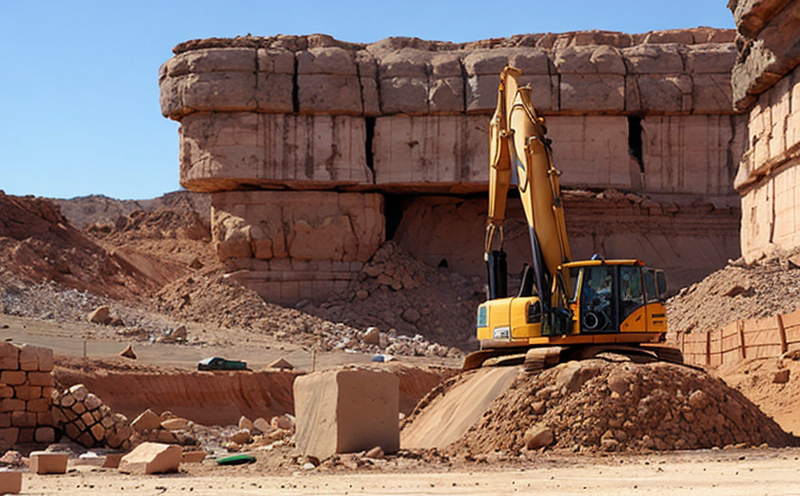Rock Mechanics & Geotechnical Testing
The field of rock mechanics and geotechnical testing is crucial for ensuring the safety, durability, and sustainability of mining operations. This testing encompasses a wide range of disciplines that evaluate the mechanical behavior of rocks under various stress conditions. These tests are essential in predicting the stability of mine walls, tunnels, and slopes to prevent catastrophic failures.
The primary goal of rock mechanics testing is to understand how different types of rocks behave when subjected to external forces such as pressure or tension. This knowledge is vital for designing safe and efficient mining operations. For instance, understanding the shear strength of rocks helps in determining the stability of mine slopes and cuttings. Similarly, tensile strength tests are critical for assessing the integrity of rock formations under potential failure modes.
Geotechnical testing complements rock mechanics by focusing on soil and other granular materials found within mining environments. Soil properties such as cohesion, friction angle, and compressibility play a significant role in determining the stability of excavation support systems and the overall geomechanics of mine structures.
In practice, rock mechanics tests involve specimen preparation using specialized equipment like splitting dies or drilling rigs to obtain representative samples. These specimens are then subjected to various loading conditions in laboratory testing machines capable of simulating real-world stresses and strains. Common test methods include uniaxial compression, triaxial compression, direct shear, and point load tests.
The interpretation of these tests is based on established standards like ISO 14689-2 for rock mechanics and EN 1997-3 for geotechnical engineering. Compliance with these international standards ensures accurate and reliable results that are widely accepted within the industry.
- Uniaxial compression tests measure the compressive strength of rocks under constant axial loading.
- Triaxial compression tests simulate in-situ stress conditions more accurately by applying pressure from all three directions.
- Direct shear tests evaluate the sliding resistance between rock surfaces.
- Point load tests assess the resistance to crushing under a single point force.
The data obtained from these tests is used in conjunction with geological surveys and site-specific conditions to optimize mining designs. For example, understanding the friction angle of soil can guide decisions regarding excavation support systems or ground anchors.
Eurolab Advantages
As a leading provider in rock mechanics and geotechnical testing, Eurolab offers unparalleled expertise and cutting-edge technology. Our state-of-the-art facilities are equipped with the latest testing machines that can replicate real-world conditions precisely.
- We provide ISO/IEC 17025 accreditation ensuring the highest standards of reliability and accuracy in all our tests.
- Our experienced team of engineers and technicians ensures precise specimen preparation and consistent test results.
- Eurolab’s extensive database of testing results allows for comparative analysis, which enhances decision-making processes.
Our commitment to quality is reflected in our adherence to international standards such as ISO 14689-2 and EN 1997-3. This ensures that the test data we produce is both accurate and relevant for your specific mining needs.
We also offer comprehensive consulting services, helping you interpret results and implement strategies based on our findings. Whether it's improving safety protocols or optimizing extraction methods, Eurolab’s expertise can significantly enhance operational efficiency and sustainability.
Environmental and Sustainability Contributions
The testing services offered by Eurolab play a pivotal role in promoting environmental responsibility within the mining sector. By accurately predicting rock and soil behavior, we enable more sustainable extraction practices that minimize ecological impact.
Our tests help identify potential hazards early on, allowing for proactive measures to mitigate risks. This reduces the likelihood of accidents that could cause significant environmental damage. For instance, by understanding the stability of slopes and cuttings, Eurolab assists in designing safer mine layouts that protect both workers and surrounding ecosystems.
In addition to safety improvements, our testing contributes to more efficient resource utilization. By optimizing extraction methods based on test results, mining operations can reduce waste and lower energy consumption. This not only enhances profitability but also supports broader sustainability goals.
Furthermore, Eurolab's expertise in geotechnical engineering is instrumental in developing reclamation plans that restore mined areas to their natural state after extraction activities cease. This aligns with global initiatives aimed at achieving net-zero carbon emissions and sustainable development.
Competitive Advantage and Market Impact
- Innovative Testing Methods: Eurolab continuously invests in research and development to incorporate the latest testing methodologies into our services. This ensures that we are at the forefront of industry advancements.
- Comprehensive Reporting: Our detailed reports not only provide test results but also offer actionable insights based on extensive analysis, helping clients make informed decisions quickly.
- Global Recognition: Eurolab's accreditation to ISO/IEC 17025 is a testament to our commitment to excellence. This recognition enhances our reputation and credibility in the global market.
These advantages position Eurolab as a strategic partner for mining companies looking to stay ahead of industry trends. Our services are particularly valuable during tender processes, where accurate and reliable test data can differentiate between competitive bids. Moreover, by adhering to international standards, we ensure that our clients meet regulatory requirements without compromising on quality.
The demand for sustainable and efficient mining practices is growing, driven by increasing environmental awareness and economic pressures. Eurolab’s expertise in rock mechanics and geotechnical testing helps companies navigate these challenges effectively. Our services enable mines to operate more responsibly while maintaining productivity and profitability.





